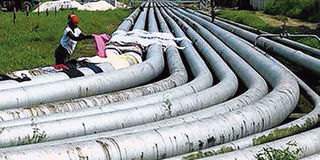A new push to keep conflicts at bay as TZ seeks oil, gas benefits

An oil pipeline. There has been a push for a comprehensive overhaul of laws governing natural resources in Tanzania, and East Africa as a whole. It has gathered momentum after recent discoveries of more oil and gas in the member states
What you need to know:
This is one of the fundamental issues that a new project is seeking to address through pushing for more legal reforms in the extractive sector.
Arusha. With the recent discoveries of huge natural gas reserves, Tanzanians have joined the league of an estimated 3.5 billion people in the world who live in countries rich in oil, gas and minerals. But how will the East African giant evade the global resource curse almost synonymous with this kind of wealth?
This is one of the fundamental issues that a new project is seeking to address through pushing for more legal reforms in the extractive sector.
Launched recently in Arusha, the Canadian-supported Supporting Inclusive Resource Development in East Africa (SIRD) is aimed at pushing for law reforms in the oil and gas sectors to make them beneficial to the local people -- an apparent bid at stemming conflict sparked by inequatable distribution of benefits.
Speaking at the launch, Ms Florence Ochago, the principal legal officer with the East African Community (EAC), reiterated that the country needs to tread careful as it seeks to utilise the natural resource.
“There has not been prudent planning and management of most natural resources, especially oil, leading to massive exploitation of communities and little improvement of the poverty in the resource-rich areas,” she said at the two-day forum.
She noted that in many countries it “skewed” distribution of benefits from the extractive industry that are exacerbated by bad policy and legal frameworks, sparking conflict.
The two-day forum, which brought together representatives from the women’s groups, government, private sector, academics and NGOs, was also aimed at analysing the governance structures of the extractive industry in the region.
It was also intended to identify key challenges and opportunities that will maximise and benefits and reduce harms, in particular to women and girls, affected by the mega oil, gas and minerals projects.
Matters pertaining to the extractive industries have been rather controversial for years even as many African countries discover more oil, gas and mineral resources.
At one time, the Tanzania government admitted that it was having difficulties to negotiate and manage large-scale investment contracts because of anomalies over taxation. One of the reasons was that many taxation experts and lawyers lacked necessary skills in making tax assessments especially for the extractive industry.
“We in the midst of extracting huge deposits of gas in our country. We need to enhance the capacity of the government to negotiate and manage large-scale investment contracts,” a senior government official said here during one of the capacity building workshops for tax experts and lawyers.
Some five years ago, experts from the EAC member countries met in Bujumbura, Burundi to fine tune what they said were final draft frameworks to guide the development and promotion of extractive industries and value-addition in the region.
They also examined and identified the mineral resource potential and opportunities for value-addition within the region with specific focus on the existing legal, regulatory and institutional frameworks in the extractive and mineral processing industries.
Generally, Africa’s experience with oil and minerals has not been rosy. In the majority of resource-rich countries, exploitation of natural resources is invariably linked to corruption, economic stagnation, conflict, social inequality and widespread poverty.




